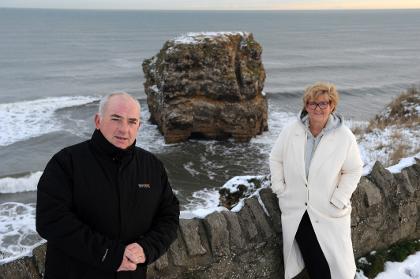Council Calls for Better Water Quality Testing
Calls are being made for more government intervention to help improve water quality in coastal communities like South Tyneside.
South Tyneside Council has written to the Secretary of State for the Environment to lobby for better procedures in water quality testing, highlighting the Council’s commitment to the environment and challenging the Government to do more to help protect waters nationally.
South Tyneside Council has written to the Secretary of State for the Environment to lobby for better procedures in water quality testing, highlighting the Council’s commitment to the environment and challenging the Government to do more to help protect waters nationally.
Councillor Tracey Dixon, Leader of South Tyneside Council, said: “Coastal communities are disproportionately impacted by climate change due to more frequent extreme weather impacts and changes in ocean chemistry, water temperatures and sea levels.
“However, we don’t have a full picture of what is in our waters and the impact this has on our environment, because the water quality testing regime in England is limited. Testing is currently restricted to designated bathing water beaches to ensure human health is protected and restricted to main rivers to determine their ecological status. This means that many of the coastal and inland waters are not tested at all.
“Testing also doesn’t extend to ordinary watercourses which receive many discharges from combined sewer overflows and can impact water quality and the environment.”
South Tyneside Council is the designated bathing water controller for Sandhaven beach and Marsden Bay. Following testing during last year’s bathing water season (May to October), Sandhaven was classified by DEFRA as being of ‘good’ quality and Marsden Bay as ‘sufficient’.
Councillor Ernest Gibson, Lead Member for Transport and Neighbourhoods and Chair of the Local Government Association Coastal Special Interest Group, said: “As national lead for coastal issues, I know that many councils nationally are concerned about water quality.
“South Tyneside is no different. While we have beautiful beaches and they are extremely popular with residents and visitors all year round, we have concerns about testing.
“More frequent instances of extreme weather due to climate change also means that storm overflows are used more often. A more comprehensive year-round testing regime for inland and coastal waters would help us better understand what is being discharged into our streams, rivers and offshore.
“That way, we can look at the impact it is having on the environment and work with our partners to see where water quality improvements should be targeted and ensure our water courses and oceans are better protected.”
The Council notes that the Government is seeking to make improvements through the Storm Overflows Discharge Reduction Plan. However without an adequate evidence base, the environmental impacts are difficult to assess. It is also understood that water quality tests do not sample for emerging threats such as antibiotic resistance and microplastics.
Councillor Gibson added: “Timescales for proposed investments also mean that improvements may not be made for almost 20 years in certain areas. We want to see action taken sooner rather than later.”
One of the ways of slowing down rainfall to help protect capacity in the sewer system is by using sustainable urban drainage systems, such as basins, permeable paving and swales, measures which have been implemented in South Tyneside over recent years, including Cleadon, Monkton and Fellgate flood alleviation schemes.
South Tyneside Council made an ocean recovery declaration, Motion for the Ocean, in January 2022, to recognise the importance of oceans and to drive forward action to protect, enhance and restore them. The declaration includes calling for strengthened legislation through national policy change, the development of an Ocean Recovery Strategy and lobbying for a dedicated minister for Coastal Communities.
The work supports the Council’s ongoing efforts to tackle climate change and environmental issues.

